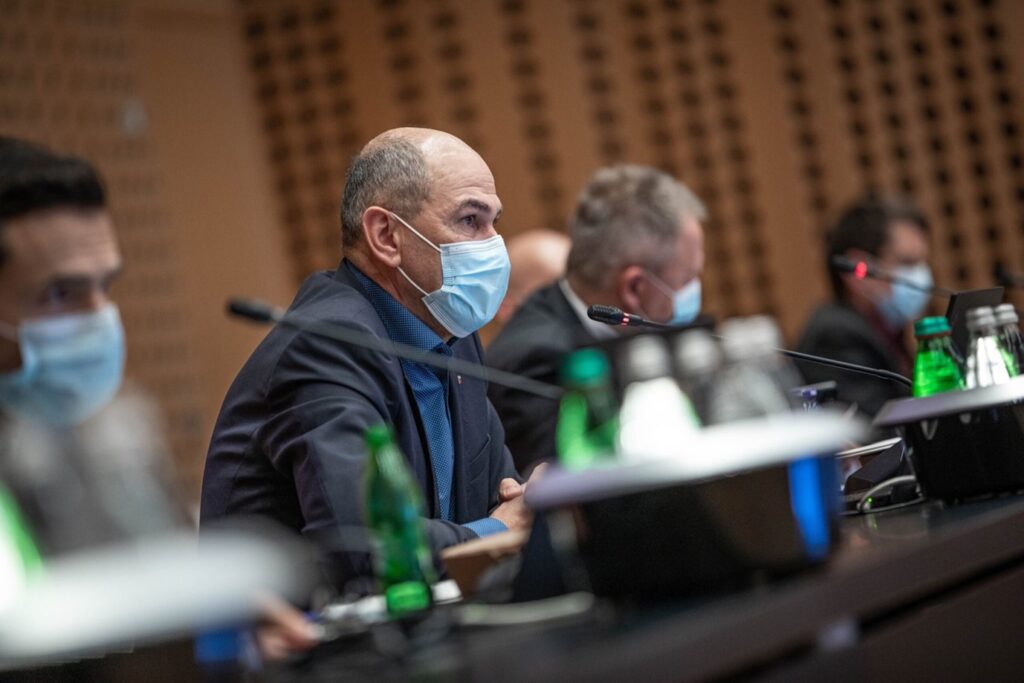For more than a year now, the Government of the Republic of Slovenia has been dealing with the epidemic and its consequences, which has taken up most of its time. However, despite the epidemic, the government sought to achieve the key goals of the coalition agreement.
During its time in the office, the government has, among other things, drafted and implemented eight anti-corona legislative packages, improved the absorption of European funds, helped improve the country’s credit ratings, raised the lump sums, significantly increased the diplomacy activities, improved the position of the Slovenian Armed Forces and began procedures for the de-bureaucratisation and digitalisation of Slovenia.
The anti-corona legislative packages covered all citizens of the Republic of Slovenia
To date, the government has adopted eight anti-corona legislative packages, the intention of which was to provide help for the population and the economy of our country. Slovenia was practically the only country that addressed everything with the legislative packages. The anti-corona packages also contributed a lot to Slovenia’s rapid recovery, which is why the country has done significantly better than the forecasts made at the beginning of the epidemic predicted. At the time, Slovenia’s GDP was forecast to fall for about the average amount in the European Union – seven percent. At the end of the year, 120 thousand unemployed and a significantly larger deficit in the state treasury were forecast. The fall in GDP today is below the EU average, and so is unemployment. At the end of the year, the actual fall in GDP was more than 20 percent lower than what was forecast, and unemployment figures show that we are now below 85 thousand unemployed.
Credit ratings are historically high
During the time of the government led by Janez Janša, the credit ratings of the Republic of Slovenia remained unchanged, and Moody’s even raised its credit ratings for Slovenia in early October last year. In this way, Slovenia proves that it continues to be a trustworthy country for foreign investors. According to the agencies, the reasons for favourable projections of macroeconomic indicators lie in the effective government measures, which have made the economic shutdown relatively short, and in the extensive support programmes that reduce the effects of the epidemic on the labour market and help maintain the economic financing.
Improving the absorption of European funds
The current government has made major steps forward in drawing the European funds in 2020, compared to the previous years. Last year, the highest share of absorption of the EU funds for the financial perspective 2014 – 2020 was achieved, compared to the planned funds, namely 90 percent. 101.4 million euros of European funds were absorbed, out of the planned 112.5 million euros. In the field of European cohesion policy alone, this share was as high as 93 percent. In 2021, the trend of drawing EU funds will further intensify, as we plan to double the realisation of the EU funds, in the amount of 217.4 million euros.
In addition, the team led by Prime Minister Janez Janša reached a historic agreement with the European Commission in July 2020 on the funds available until the year 2030. Slovenia negotiated 432 million euros more than planned in 2018 for the implementation of the 2021 – 2027 multiannual financial framework.
Raising the lump sums for Slovenian municipalities
The government is aware of the importance of local communities, so in April 2020, it proposed raising the lump sums to the amount agreed to in the coalition agreement – from the previous 589.11 euros to 623.96 euros. Thus, the municipalities received as much as 73 million euros more in funding than planned. In September 2020, the Agreement on the amount of the lump sums for the financial year 2021 and 2022 was signed, which was only the third time in the last 15 years this has happened. Municipalities will receive 682.20 euros in 2021. The same amount is planned for the year 2022 and will be finalised in the budget documents. Thus, the government allocated almost 40 euros more for the municipalities’ lump sums last year.
Increased activity of the Slovenian diplomacy
The government team, especially Prime Minister Janez Janša and the Minister of Foreign Affairs Anže Logar, Ph.D., have strengthened strategic cooperation with our allies. In this term of office, foreign policy coincided with a common vision of a confident and active foreign policy, which will strive to strengthen alliances with all countries in the world, with which the Republic of Slovenia shares values and interests.
Improving the position of the Slovenia Army
The Act on the Provision of Funds for Investments in the Slovenian Armed Forces in the Years 2021 to 2026 has also been adopted, which provides a gradual, transparent and stable source of financing for the most urgent investments in armaments and equipment of the Slovenian Armed Forces in the total estimated value of 780 million euros over the next six years. In addition, the situation of soldiers older than 45 has improved. Namely, the Act Amending the Defence Act has also been adopted, which solves the challenge of employing soldiers over the age of 45 and provides them with greater social security. The law enables the continuation of a career in the Slovenian Armed Forces or at the Ministry of Defence or re-employment in another state body without public competition while maintaining the previous salary amount.
De-bureaucratisation and digitalisation of Slovenia
The government led by Janez Janša wrote in its coalition agreement that they would present quality, efficient and fair governance with the state on the principle that the state and all public sector institutions serve as a service to the citizens and the economy, and do not represent an obstacle. In light of this, the government decided to de-bureaucratise and digitalise the country, thus enabling Slovenia to develop faster and prosper. Therefore, the government formed the Strategic Council for De-bureaucratisation, which has already drafted the first legislative package, and the Strategic Council for Digitalisation.
Sara Kovač


